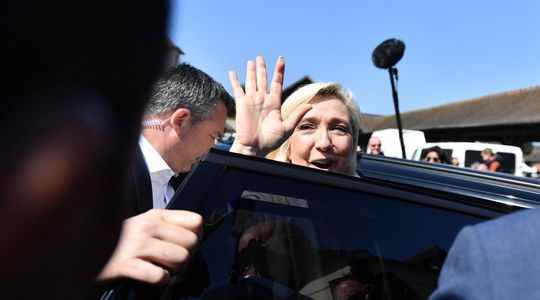With the presidential election, France is living its Trumpian moment. It realizes that it rests on a democratic base fragile enough to be able to destroy even imperfect alliances which are nevertheless the only condition of its strength, in a world held by the great powers. These structuring alliances are NATO, the European Union, the euro.
As was the case with the election of Donald Trump in the United States and the Brexit referendum in the United Kingdom, a large majority of French voters in the first round (60%), added to the abstainers (26%), voted for, or let win, extreme parties, left populists or populist nationalists, protesters, anti-elite, anti-system, anti-European, pro-Putin or lenient with him.
They voted in fact, and whatever their initial motivations or tactics, for candidates who refuse to deliver arms to Ukraine and impose sanctions on Russia, and who do not hesitate, on behalf of a so-called “pacifism”, to dub Vladimir Putin’s invasion of Ukraine and to give him discharge for his war of aggression. They voted for candidates who spare the Russian dictator or support him frankly, by sending back to back the Atlantic Alliance and Putin’s Russia in the responsibilities of the war. They voted for candidates who do not establish a hierarchy or preference between dictatorship and democracy.
A crucial election for the march of the world
This election is historic because it is a geopolitical tipping point. It takes place at the very moment when a dividing line is being redrawn on the planet like never since the end of the cold war, between on the one hand the camp of dictatorships and authoritarian regimes (Russia, China and partners) and on the other that of Western democracies – certainly not always exemplary (United States, European Union, NATO allies).
It takes place at a time when alliances are forged and undone around a savage war of invasion waged by a nuclear power on the European continent, for the first time in the world after 1945. It is also a referendum in disguise on the Frexit, at the heart of the still lively ideological battle between nationalists and Europeans. Never has a French ballot been so central to global issues.
Emmanuel Macron and Marine Le Pen, who are facing each other in the final for the second time, are fighting a much tighter battle. Emmanuel Macron, who no longer has the freshness of disruption, embodies a fragile centrism that is no longer central, caught between a radicalized left and right. Marine Le Pen has changed her strategy: she no longer wants to be called extreme right, friend of Putin, anti-euro or anti-Europe. Since her catastrophic 2017 debate with Macron and her failed tirade against the single currency, she has taken a turn on the wing, at least in words. Are the French attached to the EU and the euro? She keeps them! Since the war in Ukraine, another express turn. Images of war crimes are unpopular? She distances herself from her Kremlin mentor and pesters the election pamphlets that featured the photo of her 2017 meeting with him.
His program marks the end of France in the EU
Marine Le Pen is now advancing in camouflage. Voluntary (or not) spokesperson for Vladimir Putin, she takes up word for word the two pillars of what he proclaims to be his “war against the West”: the division of the Atlantic Alliance and the weakening of the European Union. Masked frexiteuse, her reassuring generalities on the maintenance of the euro do not resist the reality of her program, which leads straight to an exit from the EU.
By establishing “national border control”, it calls into question the single market, the pillar of European construction. By contesting Franco-German cooperation or the primacy of European law, it destroys the engines of the EU. By limiting France’s net contribution to the common budget, it creates a casus belli. And who says Frexit says exit from the euro (which it had, reasonably, decided to give up).
There remains his “alliance of nations” – implied: nations faithful to the Putinian model of “illiberal democracy”. Problem: the war in Ukraine pulverized the group of illiberal cronies, all anti-Putin, except two: Marine Le Pen and Viktor Orban, reelected at the head of Hungary (10 million inhabitants). It remains the alliance with a great Russian dictator and a small Hungarian autocrat, with whom it has taken out bank loans. Patriotic glory according to Le Pen.
